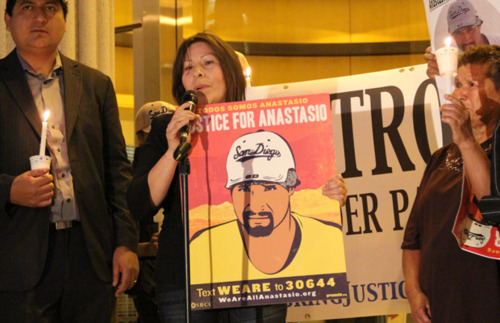
Maria Puga
Tomorrow, June 23, is International Widows Day, established in 2010, the year of Anastasio Hernández-Rojas’ death. This is the story of Maria Puga, his widow, who said, “No, justice must be served.”
On May 2, 1968, Anastasio Hernández-Rojas was born in San Luis Potosi, Mexico. At the age of 15, he moved north, to San Diego, to find work and send money home. At 21, he met Maria Puga. Over the next 20 years, the couple had five children, all born in San Diego. The eldest was born in 1990. The youngest, twins, were born in 2006. Anastasio Hernández-Rojas worked in construction and demolition, until the housing market crashed. On May 10, 2010, Anastasio Hernández-Rojas was arrested for shoplifting groceries. On May 24, he was deported. On May 28, he and his brother tried to re-enter the United States. They were detained at the border. Then Anastasio Hernández-Rojas was brutally murdered by Custom and Border “Protection” officers. The San Diego coroner determined that Anastasio Hernández-Rojas’ death was a homicide. The State tried to have Anastasio Hernández-Rojas’s story end there, just another `unfortunate incident’ in the borderlands, but Maria Puga began a mighty campaign demanding justice for her husband, her children, herself, and all who migrate across the borderlands. Seven years later, Maria Puga’s campaign continues.
Anastasio Hernández-Rojas was murdered in the open, in front of witnesses, and cameras. Otherwise, we would never know his story. We would not know that Anastasio Hernández-Rojas was tortured for an extended period, during which he howled and begged for help. We would not know the depth and extent of viciousness and cruelty that passes for “protection” on the United States southern border.
But we do know. We know because Maria Puga said NO to silence. She pressed for information and pushed for answers. At each step, she was stonewalled.
In 2012, the Public Broadcasting Service aired “Crossing the line at the border”: “Eight people have been killed along the border in the past two years. One man died a short time after being beaten and tased, an event recorded by two eyewitnesses whose video is the centerpiece of the report. Both eyewitnesses say the man offered little or no resistance … The report raises questions about accountability. Because border agents are part of the Department of Homeland Security, they are not subjected to the same public scrutiny as police officers who use their weapons. It also questions whether, in the rush to secure the border, agents are being adequately trained. And it raises the question: why aren’t these cases being prosecuted?”
The officers who tortured Anastasio Hernández-Rojas to death were never charged with any criminal offense. In 2015, the Justice Department decided there wasn’t sufficient evidence to prosecute. Upset but undeterred, Maria Puga called on President Obama to “conduct an administrative investigation to punish the agents who were involved in Anastasio Hernández’s case.”
Maria Puga also continued to pursue a civil lawsuit. In February 2017, the Federal government agreed to pay $1 million to Anastasio Hernández-Rojas’s five children. While that was welcome news, Maria Puga still demanded an admission of guilt. Maria Puga responded to the news of the settlement: “The settlement isn’t justice, but it is a badge of shame. No amount of money can bring back Anastasio. No family should ever have to go through this. We don’t want to have more cases like that of Anastasio.”
In 2016, on the eve of another agency internal review, Maria Puga directly addressed the Customs and Border “Protection” agency: “My name is Maria Puga, wife of Anastasio Hernandez, who, five years ago, was brutally killed by Customs and Border Protection agents. We, along with other families, have been struggling for more than five years, in search of justice. We’ve been together, I’ve spoken with families, and I know the great pain they feel, which is the same as mine, from having lost a loved one and being unable to find justice. Now the CBP Internal Affairs will review the case of my husband Anastasio. We hope that this time the review will be transparent and just, that they recognize the truth, what really happened to my husband.”
Nothing came of the review.
In 2016, Maria Puga filed a petition with the Inter-American Commission on Human Rights. The Commission recently agreed to hear the case. As Maria Puga explains, when the Justice Department decided not to prosecute anyone for the death of her husband, “In that moment, I said, ‘No, justice must be served,’ and that’s why we’re here. There are other cases and similar circumstances that must be solved. We want justice for all the families who have been victimized by Border Patrol.”
Maria Puga is Anastasio Hernández-Rojas’s widow. She is part of the Borderland of Widows, produced by State policy of militarized and securitized borders. Militarized borders mass produce widows. That’s their goal. From Australia to England to the European Union to the United States, militarized, securitized borders create borderlands in which largely poor women of color are deemed to be so much detritus. The living dead of the new world order, widows are meant to wrap themselves in mourning, slink off into the shadows, whimper for a bit, and die. Maria Puga said, “No, justice must be served.” The struggle continues. The widows demand justice.

(Photo Credits: Fusion / Sharis Delgadillo)